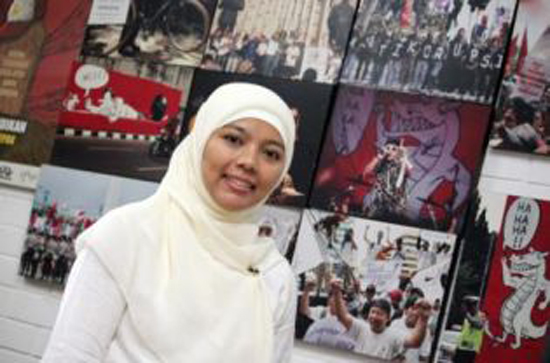
Sely Martini is not your ordinary woman. Yes, she’s a young wife and mother of three, she’s lovely and kind, and she is strong, too. But what stands out most is her passion and utter commitment to change.
As deputy coordinator of Indonesia Corruption Watch, Martini has devoted her life not only to her family but also to one of the country’s biggest challenges - the fight against corruption.
Her answer as to why this commitment to such an immense issue is straightforward — corruption makes people suffer.
“The government has the money for development, but then some culprits take the money and the beneficiaries get nothing,” she says. “This is public money that should go to the public sector — like health care, education, drainage, roads.”
Her voice doesn’t sound angry, but rather concerned for the disadvantaged.
“The poor can’t get access to the private hospitals or private education, so [they] will suffer more because of corruption,” she continues. “Corruption eats the cake before you can eat it. [It’s] the core of developmental problems.”
Having volunteered for ICW during her university years in Bandung, the 34-year-old joined the non-government organisation after earning her degree and has been working there for eight years.
Monitors corruption
She now monitors corruption within the forestry sector and takes care of disaster management, which includes the monitoring of donated money — especially in Aceh after the tsunami.
Martini is also working with the community on how it should monitor regulation implementations, while looking for loopholes in the policy.
“What kind of loopholes?” she asks. “Who is the actor involved in the policy implementations? If it’s corruption, what should be done with the loopholes?”
On first sight, the reasons for her work appear to be simple. “I’m working for my children, so they can get good access to education, to the health sector — in a good way — without corruption,” she said referring to her kids, who are all aged five years or younger.
Juggling motherhood with her full-time four-day working week isn’t always easy.
“[My children] always ask, ‘Why are you always working? We want to be with you!’ They are so lovely, and I miss them always.
“I also want to be with them, and they inspire me. We [at ICW] are young parents and we fight against corruption.
“But there is also the idea of being a mother. [Children] need intensive attention, and I want them to grow, feel safe and assure them that their parents are around.
“My work is not separate from being a mother. I’m doing my best, and I try to give 100 percent attention to both.”
Challenging task
That can be challenging, as Sely Martini ’s husband is finishing his PhD overseas. Martini’s mother helps out, looking after the kids when Martini can’t.
Daily Skype sessions with her “high school love,” an engineering lecturer — whom she only agreed to marry after he promised never to deal with corruption in his job — keep their love and support alive.
“He’s also supporting me because he knows that I’m passionate about my work,”Martini says.
It’s the desire to help people that gives Sely Martini and her husband common ground in their professions.
“It’s really nice, because we have the same passion to involve ourselves in the community. Our discussions are sometimes really inspiring.”
What is also inspiring is where her passion for battling corruption started.
“When I was young, every morning I used to read the newspaper with my grandfather and then at 9 o’clock we watched the national news on TV. Even when I was asleep, he woke me up and said, ‘Come, come and watch!’ ”
Greenpeace activists
One time, Greenpeace activists were swimming in the ocean to block a tanker — a scene Martini’s grandfather used to tell her about heroism.
“He said: ‘This is the next hero. You don’t have to stand up for your state because we are already independent. But the people you have to fight are those who are committing crime. You need to do this for your society,’ ” Martini recalls.
Her “so kind” grandparents instilled in Martini a passion to be involved in the community — from talking to street vendors and volunteering to read to the blind to encouraging friends to go to school.
“My grandpa always said, ‘No one will remember you if you don’t do anything. So you need to help others, so they will remember you,’ ” Martini said.
Despite its challenges, that is what she is doing in her role at the ICW.
“Working in here, people can be pessimistic because every day there is another corruption case. People get apathetic,” she says.
“Sometimes we feel like, ‘Oh, so many problems,’ and we feel down. And then we think, ‘No, we have a dream and we have to gather ourselves together.’ ”
Mentoring achievement
Looking at the achievement that comes out of mentoring, the community is something that motivates Martini and her team.
“It’s like, ‘Oh yeah, I’m doing a positive thing with the community.’ Then you feel positive,” Martini says with her eyes brightening up.
Although there has been plenty of intimidation from the outside in the past few weeks — with government officials showing up with an entourage — Martini turns this worry into something useful.
Her current focus is also on an internal project to put pensions for all ICW employees in place, as NGOs have no social security.
“[I’m doing this] especially because we have kids. Because we are working here, so many people try to intimidate us. If something happens, the family should have something,” she says.
“We are fighting, we are front-liners, but we also don’t want to abandon the kids, so we have to have good salary and a pension plan.”
Being a mother, wife and one of the few female workers at ICW, Sely’s position on women in the fight against corruption comes quickly.
Crucial function
“For me, the woman has a crucial and significant function in every revolution or movement,” she said. “In anticorruption as well, because women always feel responsibility everywhere — at work and at home.”
Since corruption deals with the domestic and the public sphere, women play an important role in the movement — “as a domestic and also a public person,” Martini says.
“The role of the woman in public, especially in the anti-corruption movement, should be more involved,” she added. “They have to have a space in this movement.
“Corruption is not limited to gender. There are a lot of women who are committed to corruption, and the temptation to corrupt goes to women as well as men.”
In the end, Sely has devoted her life to be a part of change and hope.
“I hope corruption will end some day. I will do this as long as I can and work to fight corruption in Indonesia, because the poor suffer more than others,” she said. “I can help to help the poor, so they have access to good education and good health. So I’m passionate, and I don’t think I will retire soon.”
Sely Martini then smiles. She knows that it won’t be an easy task.
Source: Jakarta Globe
This work is licensed under a Creative Commons Attribution-NonCommercial 3.0 New Zealand Licence.




